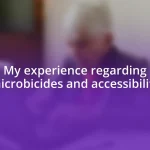Key takeaways:
- Informed consent empowers patients by fostering trust, understanding, and respect in the patient-provider relationship.
- The process must involve effective communication, thorough disclosure, and voluntary consent to ensure patients fully grasp their health decisions.
- Challenges such as health literacy, emotional strain during diagnoses, and time constraints for providers can hinder meaningful informed consent; addressing these is crucial for enhancing patient engagement.
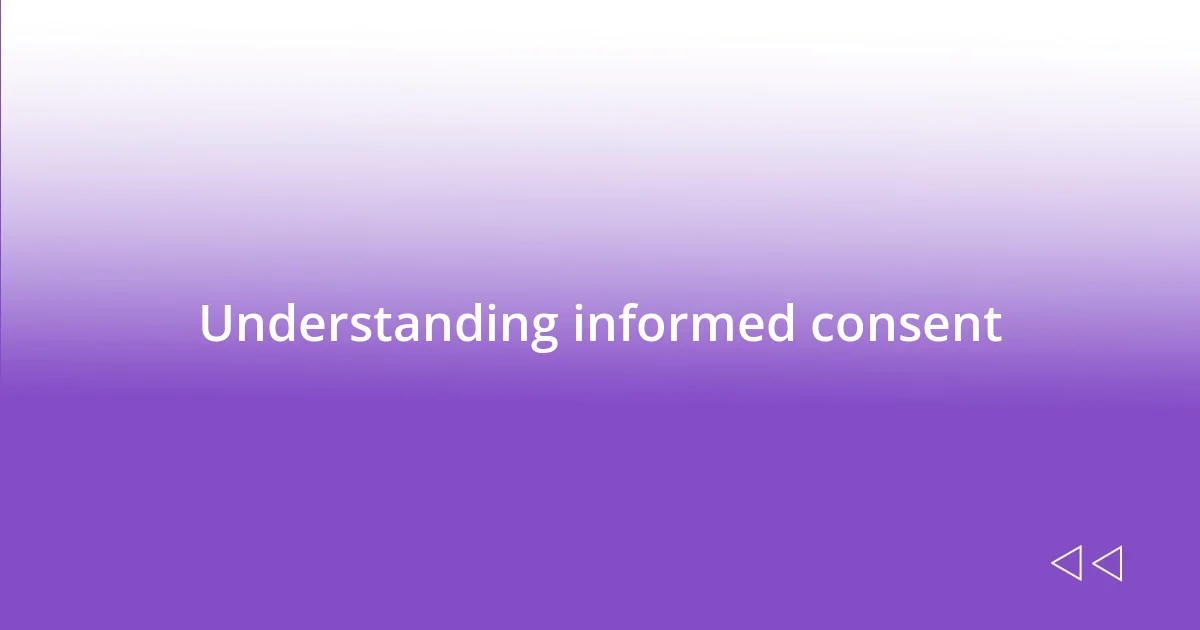
Understanding informed consent
Understanding informed consent goes beyond just getting a signature on a form. I remember when I first encountered it during a health workshop; it hit me how this concept shapes the patient-provider relationship. Why should anyone feel pressured to agree to something they don’t fully understand? The answer lies in the empowerment that informed consent brings, allowing individuals to be active participants in their own health decisions.
When I think about informed consent, I often recall a time when I felt overwhelmed by medical jargon presented to me before a procedure. The doctor spoke rapidly, but all I wanted was a clear explanation. It made me realize that truly understanding informed consent means ensuring everyone is comfortable with the information shared. Have you ever felt in a similar situation, longing for clarity? That desire for transparency is what informed consent is all about – it fosters trust and makes us feel respected.
At its core, informed consent is about more than legalities; it’s about respect and dignity. Imagine a world where everyone feels confident in their choices—a world where we can voice our concerns and ask questions without hesitation. Experiencing that kind of supportive dialogue is transformative, as it creates a safe space for both patients and providers to interact meaningfully. Isn’t it comforting to know we have the right to understand what’s happening to us?
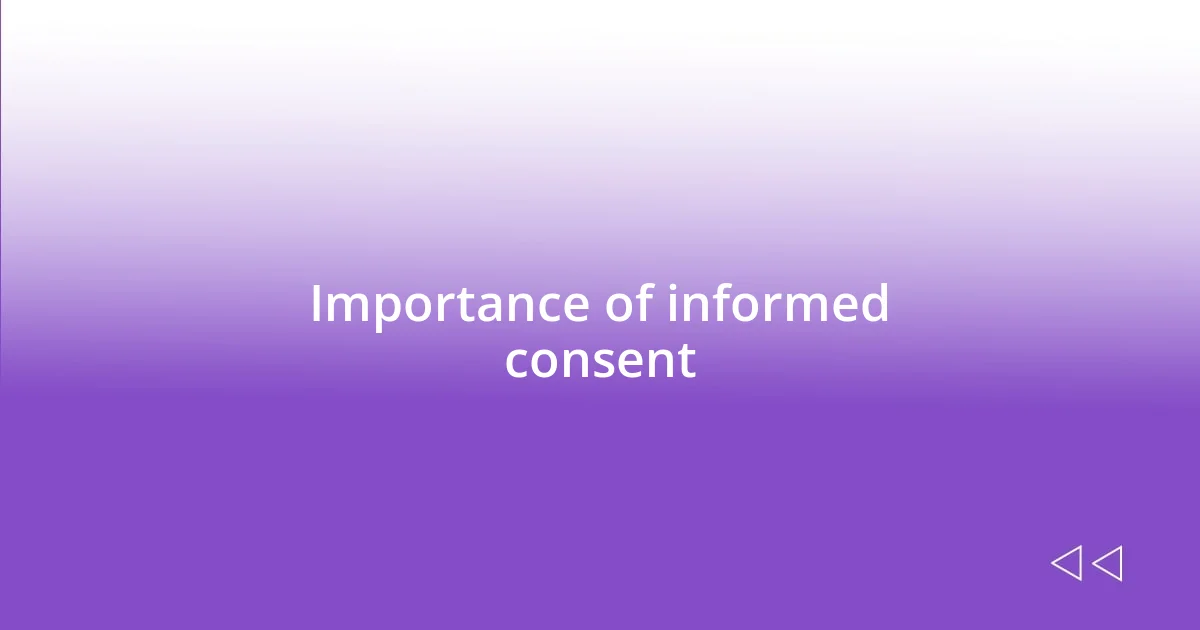
Importance of informed consent
Informed consent is essential because it honors the autonomy of individuals, allowing them to make choices aligned with their values and beliefs. I remember a family friend who hesitated to undergo a recommended surgery, feeling pressured by the medical team. When they finally voiced their concerns and took the time to understand the risks and benefits, they felt empowered to make the best decision for themselves. This experience underscored for me how vital informed consent is for fostering genuine patient empowerment.
- Builds Trust: Informed consent establishes a trusting relationship between patients and healthcare providers.
- Enhances Understanding: It ensures that individuals grasp the implications of their choices, reducing anxiety and uncertainty.
- Encourages Open Dialogue: The process invites questions and clarifications, which is crucial for patient comfort.
- Supports Ethical Practice: It reinforces the ethical obligation of providers to respect patient autonomy.
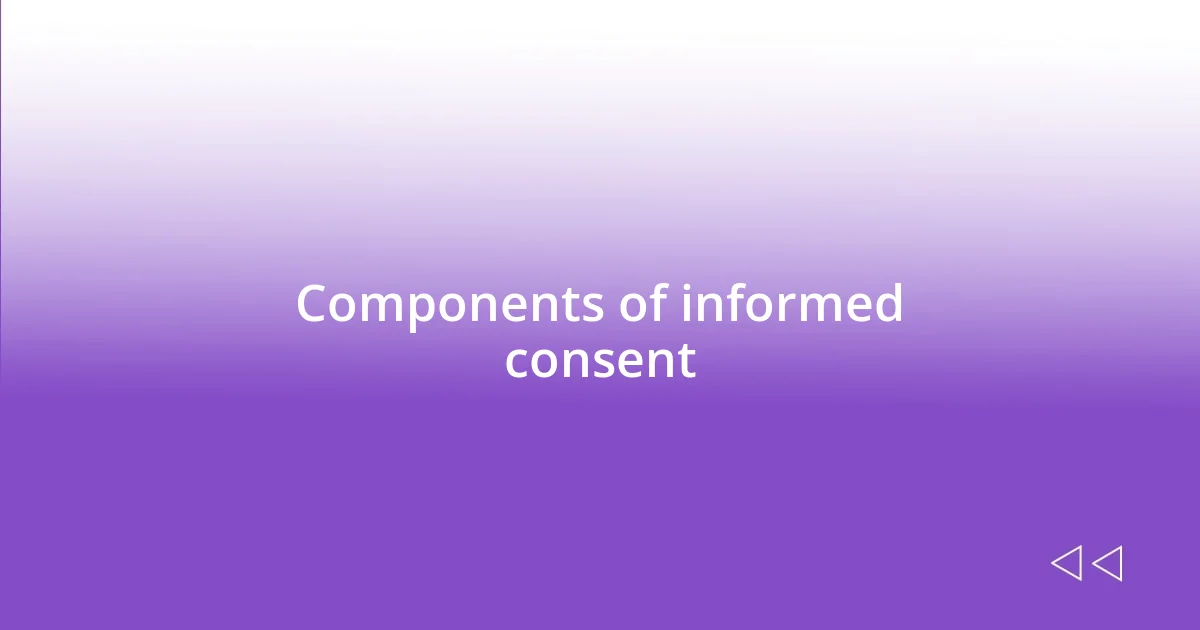
Components of informed consent
When discussing the components of informed consent, there are a few key elements that stand out to me. First, there’s the need for effective communication. I recall sitting in a doctor’s office where I was presented with a treatment plan full of medical terms. Although I nodded along, my mind was racing with confusion. That experience taught me how important it is for healthcare providers to explain information in a clear and comprehensible manner.
Another fundamental component is disclosure of information. Patients should receive comprehensive details about their condition, the proposed interventions, and any associated risks. I once had a conversation with a friend who had undergone a procedure without fully understanding the potential side effects. In hindsight, they felt that if they had been provided with all the necessary information upfront, their experience would have been less unsettling.
Lastly, it’s imperative that the consent is given voluntarily. I’ve often reflected on an incident where a relative felt pressured due to a looming deadline for a surgery. It reinforced my belief that informed consent should always feel like a comfortable dialogue rather than a rush to conclusion. This balance of clarity, disclosure, and voluntariness is what truly encapsulates the essence of informed consent.
| Component | Description |
|---|---|
| Effective Communication | Information should be presented clearly and understandably. |
| Disclosure of Information | Patients must receive comprehensive information about their condition and treatment options. |
| Voluntary Consent | Patients should feel no pressure in making decision about their health. |
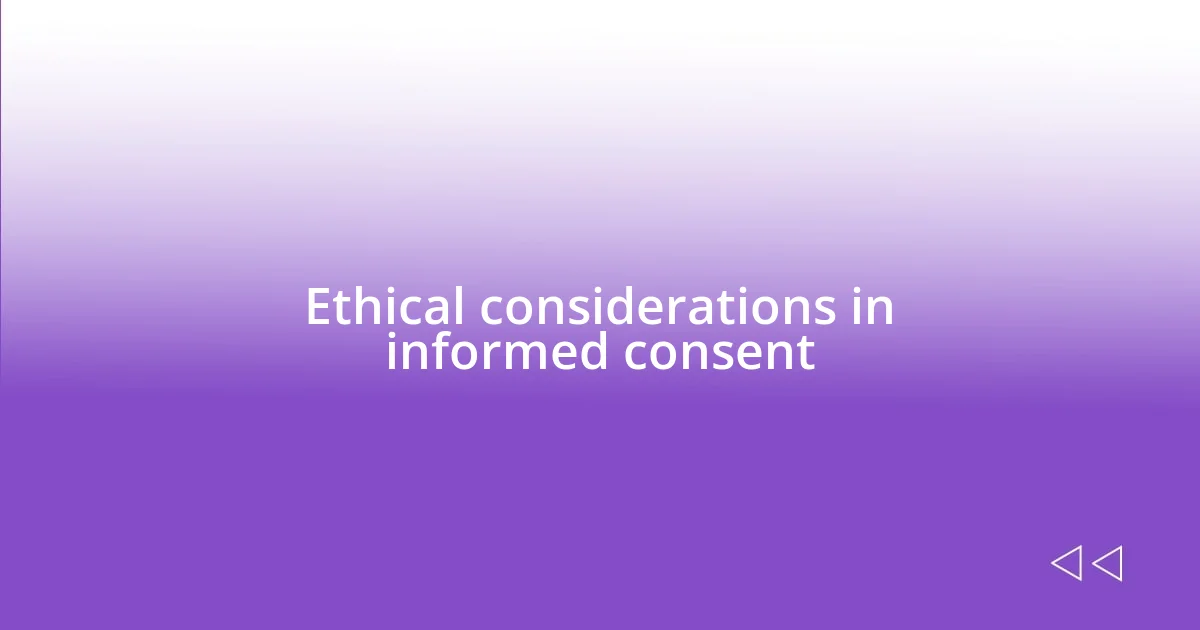
Ethical considerations in informed consent
In considering the ethical implications of informed consent, I often find myself reflecting on the inherent power dynamics at play. There’s a profound responsibility on the part of healthcare providers to ensure that patients don’t just sign a form but genuinely understand what they’re agreeing to. I once read about a patient who blindly consented to a treatment due to the authority of their doctor. That experience reminded me how critical it is for patients to feel empowered and capable of questioning, rather than simply acquiescing.
Moreover, the ethical principle of beneficence often clashes with autonomy in these scenarios. As a healthcare provider, my goal is to promote the well-being of my patients, but at what cost? A few years ago, I encountered a patient who, against medical advice, chose to forgo a treatment. Initially, I wrestled with my instincts to intervene, fearing the consequences. Ultimately, I recognized that honoring my patient’s autonomy was paramount. This tug-of-war illustrates that respecting informed consent is not just an administrative formality, but a continuous commitment to ethical practice.
Finally, I believe informed consent should be a two-way street. The dialogue between provider and patient is integral to fostering mutual respect. In one particularly moving conversation, a patient expressed gratitude for the time I took to discuss her options. She shared how it made her feel valued and heard rather than just another case number. This experience drives home the value of empathy within the consent process; it’s these ethical considerations that can transform a simple transaction into a meaningful connection.
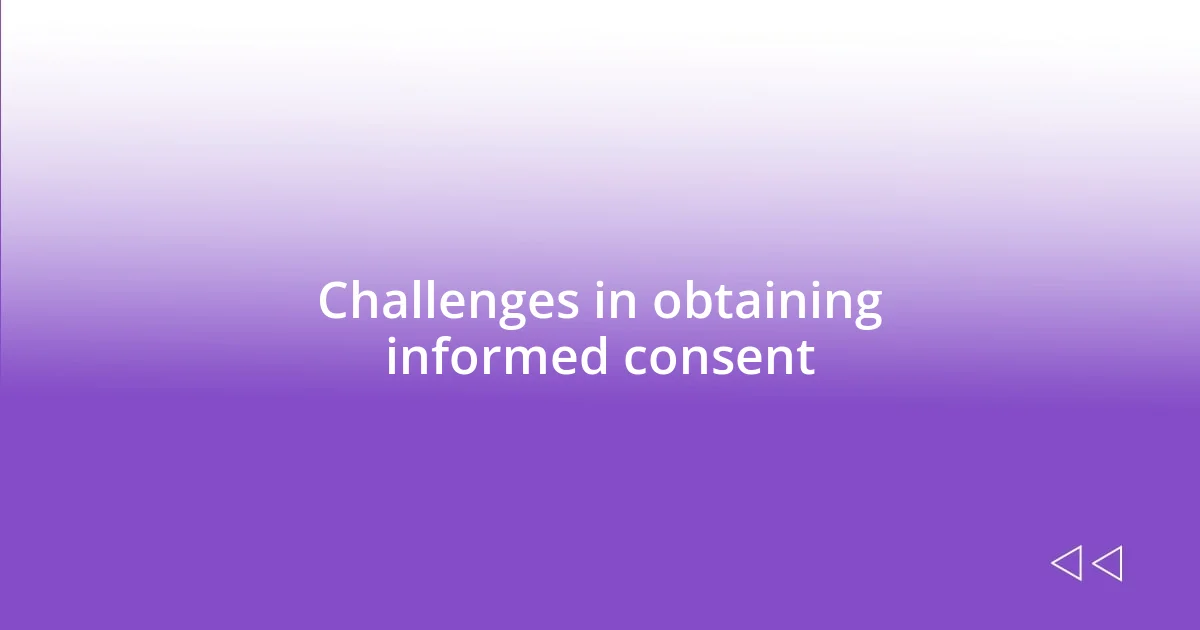
Challenges in obtaining informed consent
Obtaining informed consent can often be riddled with challenges that influence the patient experience. I remember a situation where a patient, overwhelmed by their diagnosis, simply wanted to agree to the first treatment suggested. It made me wonder, how often do patients feel they have the luxury of weighing their options? This scenario highlights the emotional toll that health crises can impose, making it difficult for individuals to engage thoughtfully in their healthcare decisions.
Another hurdle arises from the variability in health literacy among patients. Not everyone interprets medical jargon the same way. I’ve encountered patients who nodded in understanding, yet their facial expressions revealed confusion. This disconnect raises an important question: How can we bridge the gap between medical professionals and patients? It’s crucial to develop strategies that cater to diverse understanding levels—ensuring all patients can grasp the information necessary for making informed decisions.
Lastly, the time constraints faced by healthcare providers can significantly impede the informed consent process. In a busy clinic, I’ve felt the pressure to move quickly from one patient to the next. This can lead to rushing through essential discussions. Have you ever walked away from an appointment feeling like not all your questions were answered? That’s a prevalent experience, and it reinforces the necessity for a system that prioritizes thoughtful dialogue over speed. Ultimately, addressing these challenges can make a profound difference in how patients perceive and engage with their choices in healthcare.
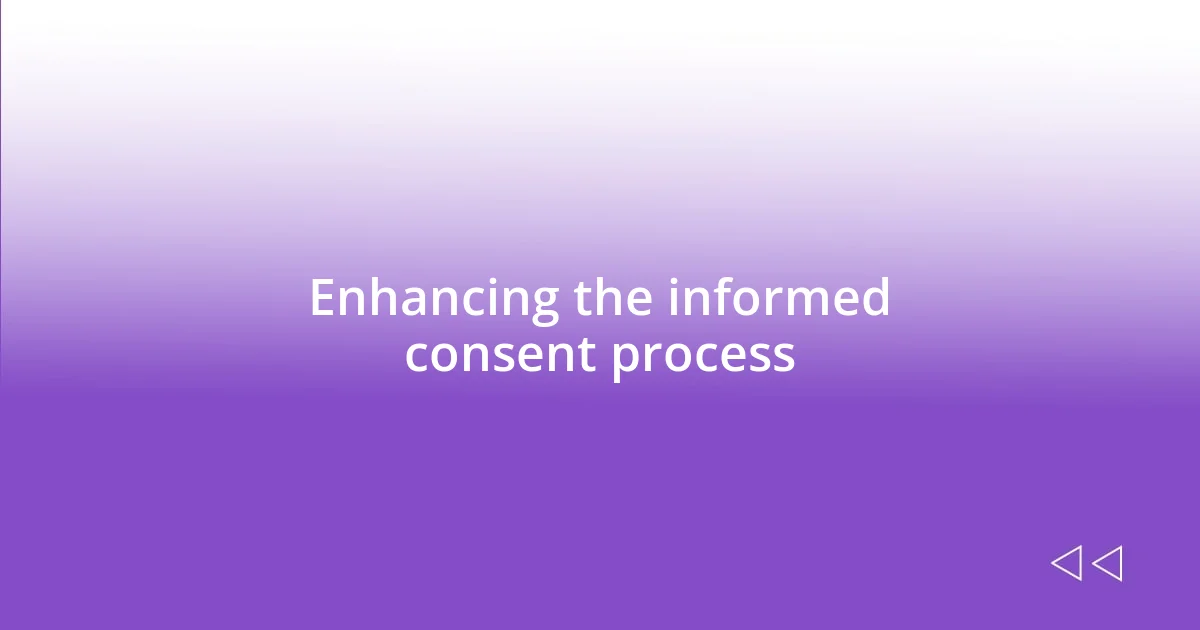
Enhancing the informed consent process
To enhance the informed consent process, creating a welcoming environment where patients feel comfortable asking questions is essential. I remember one occasion when I deliberately sat down with a patient an extra few minutes after our session wrapped up. She expressed hesitance about a specific medication, and rather than brushing it off, I encouraged her to share her worries. That open atmosphere led to a deeper conversation, and I realized how much these discussions can empower patients to voice their concerns.
Another critical aspect is simplifying the information we present. I once had a patient who was completely turned off by a long, jargon-filled brochure about a procedure. One evening, I took the time to break down the key points into everyday language and even drew a little diagram to illustrate the process. The change in her demeanor was immediate; she lit up with understanding and relief. Isn’t it amazing how clarity can transform confusion into confidence?
It’s also vital to incorporate follow-up opportunities after consent is given. In my practice, I’ve started sending a brief summary of what we discussed—sent straight to the patients’ email. I want them to have something tangible to refer back to. After all, how often do we leave a doctor’s appointment only to forget half of what was said? I firmly believe that ongoing engagement reinforces understanding and nurtures trust between patients and their healthcare providers.


